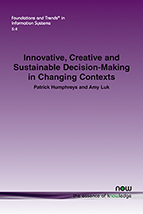Innovative, Creative and Sustainable Decision-Making in Changing Contexts
By Patrick Humphreys, London School of Economics and Political Science, UK, P.humphreys@lse.ac.uk | Amy Luk, Live Provenance Endeavour, Ireland, alukcy@gmail.com
Abstract
This monograph presents a unique and powerful bottom-up methodology for promoting and securing Sustainable Development Goals (SDGs) through innovative and creative decision-making and enactment in a wide variety of entrepreneurial innovation contexts. It identifies four sustainable development enabling factors, namely: 1) the presence of a trustworthy trading system for both private and public goods; 2) the need for communication facilities for provenance exploration, authentication and demonstration; 3) the ability to build and support entrepreneurial innovation clusters bottom-up; and 4) the ability to establish “Caravanserai” and promote transaction-based sustainable tourism within the local community. We argue that these four factors, when implemented together, can enable a strong bottom-up contribution to sustainability in all its forms.
Innovative, Creative and Sustainable Decision-Making in Changing Contexts
This monograph presents a unique and powerful bottom-up methodology for promoting and securing Sustainable Development Goals (SDGs) through innovative and creative decision-making and enactment in a wide variety of entrepreneurial innovation contexts. The authors identify four sustainable development enabling factors – (1) the presence of a trustworthy trading system for private and public goods; (2) the need for communication facilities for provenance exploration, authentication and demonstration; (3) the ability to build and support entrepreneurial innovation clusters bottom-up; and (4) the ability to establish caravanserai – and argue that these four factors can enable a strong bottom-up contribution to sustainability in all its forms.
The authors investigate the changing contexts for decision support now emerging from the responses to pandemic-driven lockdowns, explore how in ancient history a set of sustainable development enabling factors was responsible for the enduring success of safe local and trans-national trading relationships, and reveal the role of these factors in recent history. They also provide a case study example of a coffee grower in Peru that successfully promotes the full set of sustainability-enabling factors through their own bottom-up innovative and creative activities. They discuss the opportunities arising from building a Sustainability-Enabling Decision Support (SEDS) platform and conclude by examining how success stories, mediated by a SEDS at the micro level can promote into new territories at the meso sand macro level guided by these sustainable development enabling factors.

Replication Data | 2900000024_supp.zip (ZIP).
This Supplementary Material contains video files that the authors reference in their work.